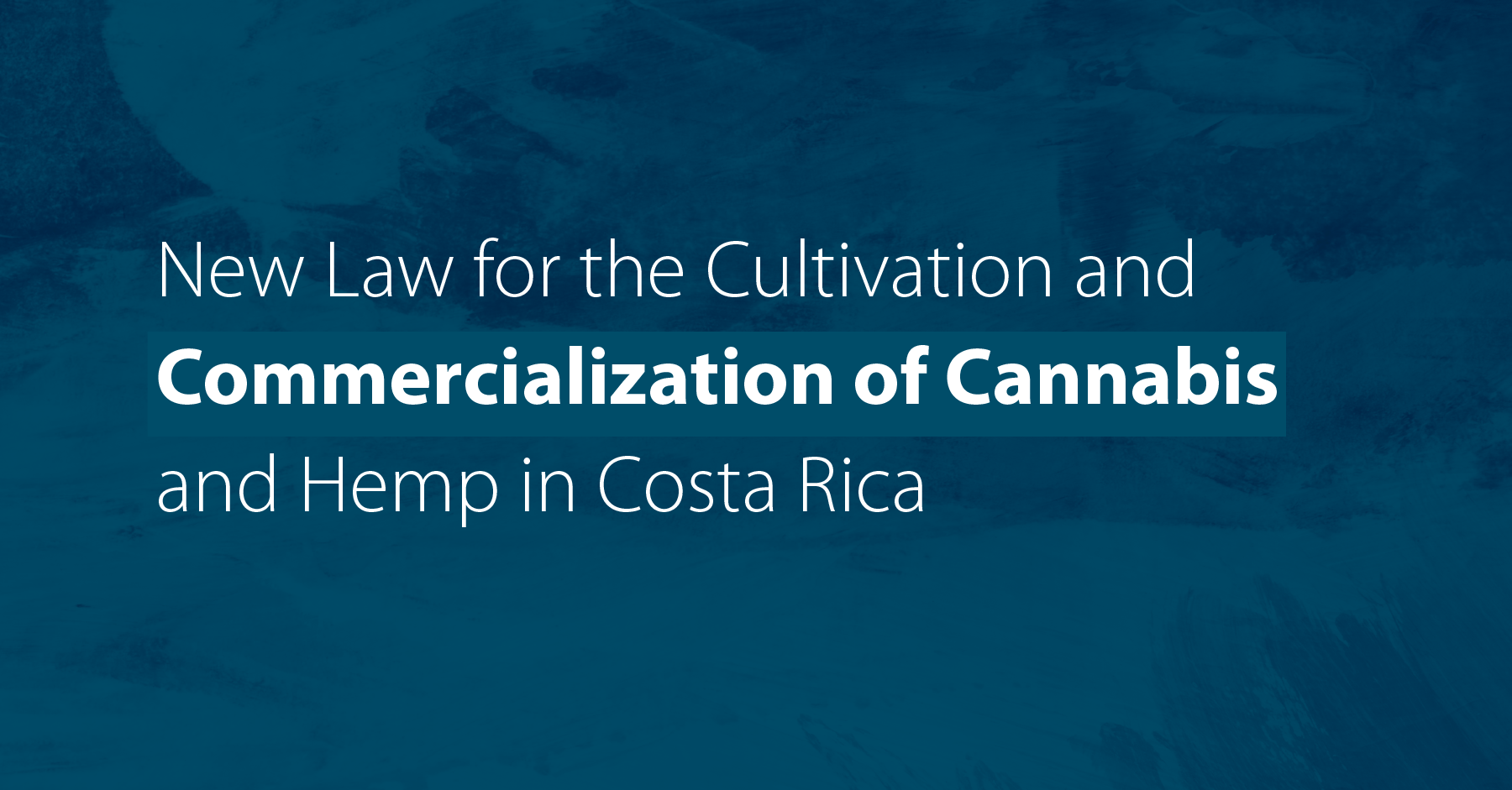Giancarlo Andreoli
Senior Associate
Costa Rica
[email protected]
In Costa Rica, recently, Law number 10.113 called “Cannabis Law for Medicinal and Therapeutic Use and Hemp for Food and Industrial Use” was approved, establishing six months to regulate said Law by the Executive Branch, which has executed those regulations as published in the official newspaper La Gaceta. Since the Ministry of Agriculture has already prepared the internal protocols needed to grant licenses, hemp cultivation in the country is permitted. However, the other public entities involved in the commercialization of hemp have not yet prepared their internal protocols to grant authorizations or the licenses necessary to process, commercialize, import, export, and research everything related to Cannabis in Costa Rica.
However, the commercialization of CBD products (including food, beverages, and cosmetics) is already allowed in Costa Rica, as long as they are 100% THC-free, signifying progress toward domestic business opportunities.
According to a recent study by Fedesarrollo de Colombia and the consulting firm Grand View Research, the global cannabis market is predicted to grow from $12 billion in 2019 to $55.8 billion in 2025.
To explain the projected growth, in part, let us consider in general terms the Sativa variety of Cannabis, a plant from which subspecies are derived, such as Marijuana and Hemp. Cannabis sativa is the source of i) THC or Tetrahydrocannabinol (psychoactive component); ii) CBN or cannabinol (with very low psychoactive content), and iii) CBD or cannabidiol (free of the psychoactive component).
We should stress that hemp and marijuana are not the same. Marijuana has high levels of THC, whose smoke inhalation or ingestion creates the psychoactive sensations that are directly related to the drug; while hemp, from which CBN and CBD derive, has zero or a minimum of, psychoactive content, not enough to create the perceptional changes induced by marijuana use. Industrial hemp is one of the oldest crops in the world and is used to manufacture textiles, food, seeds, oils, biofuels, medicines, and cosmetics, among others. Historically, hemp usage enjoyed great popularity, but after an anti-drug effort by the US Government prohibited its circulation in the 1930s, hemp was largely replaced by plastic-based products such as polyester.
The World Health Organization has already issued its criterion and has ensured that hemp and CBD-derived products do not contain any psychoactive effects. In addition, they mentioned that CBD substances with a level of less than 0.2% THC are not subject to international control since there is no health risk in their usage by consumers. As a result, many countries have created regulations that exempt from sanctions the consumption of hemp or CBD products with no or low levels of THC. Costa Rica is no exception. In 2019 BLP Legal obtained one of the country’s first permits to commercialize THC-free CBD, a milestone of progress on the subject.
Regarding the cultivation of cannabis in Costa Rica, it‘s important to note that the country has all the geographical and socio-economic facilities to carry it out. Our climate favors the cultivation of cannabis due to the constant temperature throughout the year. As a result, the cost of cultivation and processing is cents on the dollar here compared to Canada, for example. Geographical factors that have proven to favor the cultivation of coffee are very similar to those needed for cannabis, which is why we are a strategic point for its production.
The purpose of the new Law is to regulate and authorize access to Cannabis and its derivatives for medicinal and therapeutic purposes. It also permits and governs the production, industrialization, and commercialization of hemp for food and industrial use. The goal is to promote economic and social development by encouraging the production, industrialization, and commercialization of hemp and psychoactive cannabis. The Law expressly includes the use of the cannabis plant, and any derivative, including seeds and extracts, expressly including Delta-8, Delta-9, and Delta-10. It is important to note that within the text of the law such authorization enables companies to locate and operate their business under the Free Zone Regime, with all its incentives, benefits, and conditions which favor foreign investment.
Regarding Hemp Regulations, certain considerations are important to highlight, such as the percentage of hemp allowed, which was established at one percent or less in dry weight. There are two types of authorizations available for application: i) Authorization for cultivation, production, and activities related to hemp before the Ministry of Agriculture, and ii) Authorization for the manufacture of hemp derivatives and hemp-based products of sanitary interest before the Ministry of Health. Said authorizations are cost-free, are granted for six years, and may be renewed for equal periods. The procedures, inspections, and sanctions for these authorizations and their granting or cancellation, as applicable, have been established.
Regarding the Regulations for Cannabis for Medicinal and Therapeutic use, psychoactive cannabis, including plants, seeds, derivatives, and extracts, whose THC content, Delta-8, Delta-9, Delta-10, or any other psychoactive component, are equal to or greater than one percent in dry weight may legally be used. For Medicinal and Therapeutic use, three types of licenses may be requested: 1) Permission to import/export derivatives of psychoactive cannabis and/or finished product for marketing and research purposes; 2) Manufacture of derivatives of psychoactive cannabis and/or for the manufacture of medicines; and 3) Cultivation, production and related activities of psychoactive cannabis. These licenses do have a cost and may vary according to certain parameters. As well as with hemp, the procedures, inspections, and sanctions have been established for these licenses and their granting or cancellation, as applicable.
We have already seen clients who recognize the strong demand for CBD-based products, including transnational companies interested in cosmetics and food and beverages that want to compete and position themselves in the Costa Rican market. Undoubtedly, the advantages of our geographical conditions have enabled the country to become a key participant in the new “Green Gold” market.
Latin Counsel originally published this article. Read it at this link.




